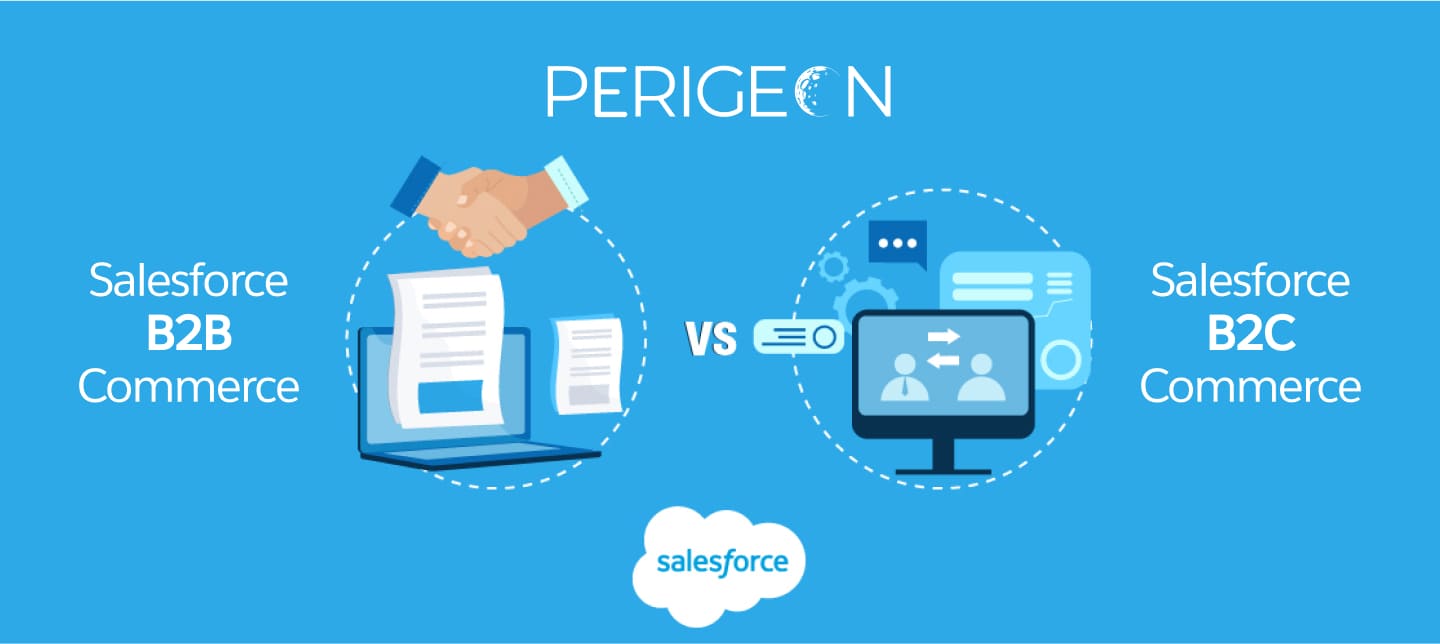In the dynamic world of e-commerce, businesses must tailor their strategies to cater to different audiences. Salesforce, a pioneer in cloud-based solutions, offers both B2C (Business-to-Consumer) Commerce and B2B (Business-to-Business) Commerce platforms. In this blog post, we’ll unravel the distinctions between Salesforce B2C Commerce and B2B Commerce, shedding light on how these platforms cater to the unique needs of consumer and business audiences.
Target Audience:
- B2C Commerce: Geared towards businesses that sell products directly to individual consumers. B2C Commerce focuses on creating engaging and personalized online shopping experiences to captivate individual buyers.
- B2B Commerce: Tailored for businesses engaged in transactions with other businesses. B2B Commerce addresses the complexities of bulk purchasing, negotiated pricing, and multi-tiered relationships inherent in B2B transactions.
User Experience and Personalization:
- B2C Commerce: Emphasizes creating visually appealing storefronts, intuitive navigation, and personalized shopping experiences. The focus is on capturing the attention of individual consumers and guiding them through a seamless buying journey.
- B2B Commerce: Prioritizes efficiency and functionality. While user experience is crucial, B2B platforms often need to accommodate the complexities of bulk ordering, multiple user roles, and diverse product catalogs.
Pricing and Quoting:
- B2C Commerce: Typically involves straightforward pricing visible to individual consumers. While discounts and promotions are common, the pricing structure is generally more standardized.
- B2B Commerce: Involves negotiated pricing, bulk discounts, and often requires a quoting system. B2B platforms need to handle complex pricing models, catering to the diverse needs of different business customers.
Catalog Management:
- B2C Commerce: Focuses on presenting a consumer-friendly product catalog. Emphasis is on showcasing individual products, cross-selling, and upselling to enhance the customer’s shopping experience.
- B2B Commerce: Requires more robust catalog management to handle large product catalogs with varying specifications. B2B platforms often involve configuring complex products and managing bulk orders.
Order Management:
- B2C Commerce: Typically involves managing individual orders with a focus on quick processing and fulfillment. Order management prioritizes the individual consumer’s experience.
- B2B Commerce: Involves handling bulk orders, managing multiple shipments, and accommodating various billing and shipping addresses. The emphasis is on optimizing the efficiency of order processing for business customers.
Customer Account Management:
- B2C Commerce: Centers on managing individual customer accounts, tracking preferences, and purchase history to enhance personalized experiences.
- B2B Commerce: Requires robust account management to handle multiple users within a business entity, each with specific roles, permissions, and access levels.
Integration with Business Processes:
- B2C Commerce: Often integrates with marketing automation tools to enhance customer engagement and loyalty programs. Integration with CRM systems may focus on individual customer interactions.
- B2B Commerce: Integrates with broader business systems, including CRM and ERP, to streamline complex business processes such as inventory management, order fulfillment, and customer relationship management.
In the e-commerce landscape, choosing between Salesforce B2C Commerce and B2B Commerce depends on the nature of your business and the audience you aim to serve. While B2C Commerce prioritizes engaging individual consumers with personalized experiences, B2B Commerce addresses the intricate needs of businesses engaged in bulk transactions. Understanding these distinctions is crucial for businesses to align their e-commerce strategies with the unique demands of their target audience, ultimately driving success in the digital marketplace.
Perigeon Software is not just a provider of Salesforce solutions; we are your strategic partner in digital transformation. With a team of seasoned professionals, a commitment to customization, and a dedication to client success, Perigeon stands as a trusted ally in elevating businesses to new heights of success through the power of Salesforce. Partner with Perigeon Software, and let’s embark on a Salesforce journey that transforms your business for the digital age.
To learn more about perigeon’s Salesforce capabilities, visit: http://perigeon.com/salesforce/
Drop us a mail at possibilities@perigeon.com to discuss your salesforce requirement.



